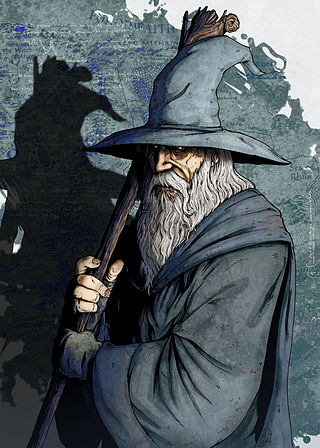Manwë refers to:
- Manwë (Middle-earth), the husband of the Elvish goddess Varda in Tolkien's mythology
- 385446 Manwë, a binary Kuiper belt object
Manwë refers to:
The Ainulindalë is the creation account in J. R. R. Tolkien's legendarium, published posthumously as the first part of The Silmarillion in 1977. The Ainulindalë sets out a central part of the cosmology of Tolkien's legendarium, telling how the Ainur, a class of angelic beings, perform a great music prefiguring the creation of the material universe, Eä, including Middle-Earth. The creator Eru Ilúvatar introduces the theme of the sentient races of Elves and Men, not anticipated by the Ainur, and gives physical being to the prefigured universe. Some of the Ainur decide to enter the physical world to prepare for their arrival, becoming the Valar and Maiar.
Finwë and Míriel are fictional characters from J. R. R. Tolkien's legendarium. Finwë is the first King of the Noldor Elves; he leads his people on the journey from Middle-earth to Valinor in the blessed realm of Aman. His first wife is Míriel, who, uniquely among immortal Elves, dies while giving birth to their only child Fëanor, creator of the Silmarils; her spirit later serves the godlike Vala queen Vairë. Finwë is the first person to be murdered in Valinor: he is killed by the Dark Lord Morgoth, who is intent on stealing the Silmarils. The event sets off the Flight of the Noldor from Valinor back to Beleriand in Middle-earth, and its disastrous consequences.
Lúthien and Beren are characters in J. R. R. Tolkien's fantasy world Middle-earth. Lúthien is an elf, daughter of the elf-king Thingol and goddess-like Melian. Beren is a mortal man. The complex tale of their love for each other and the quest they are forced to embark upon is a story of triumph against overwhelming odds but ending in tragedy. It appears in The Silmarillion, the epic poem The Lay of Leithian, the Grey Annals section of The War of the Jewels, and in the texts collected in the 2017 book Beren and Lúthien. Their story is told to Frodo by Aragorn in The Lord of the Rings.
In J. R. R. Tolkien's Middle-earth, the Eagles or Great Eagles, are immense birds that are sapient and can speak. The Great Eagles resemble actual eagles, but are much larger. Thorondor is said to have been the greatest of all birds, with a wingspan of 30 fathoms. Elsewhere, the Eagles have varied in nature and size both within Tolkien's writings and in later adaptations.

Manhoué is a commune in the Moselle department in Grand Est in north-eastern France.
The Ainur are the immortal spirits existing before the Creation in J. R. R. Tolkien's fictional universe. These were the first beings made of the thought of Eru Ilúvatar. They were able to sing such beautiful music that the world was created from it.

The Valar are characters in J. R. R. Tolkien's legendarium. They are "angelic powers" or "gods" subordinate to the one God. The Ainulindalë describes how some of the Ainur choose to enter the world (Arda) to complete its material development after its form is determined by the Music of the Ainur. The mightiest of these are called the Valar, or "the Powers of the World", and the others are known as the Maiar.

The Wizards or Istari in J. R. R. Tolkien's fiction were powerful angelic beings, Maiar, who took the form of Men to intervene in the affairs of Middle-earth in the Third Age, after catastrophically violent direct interventions by the Valar, and indeed by the one god Eru Ilúvatar, in the earlier ages.

385446 Manwë, or (385446) Manwë–Thorondor, is a binary resonant Kuiper belt object in a 4:7 mean-motion resonance with Neptune. It was discovered on 25 August 2003, by American astronomer Marc Buie at Cerro Tololo Observatory in northern Chile. A study of Manwë's light curve in 2019 suggests that it may be a contact binary object.

Manuela Malasaña is a station on Line 12 of the Madrid Metro, named for the nearby school IES Manuela Malasaña, which is named for the Spanish heroine Manuela Malasaña (1791–1808). It is located in fare Zone B2.
Thorondor may refer to:
Zakimi Ueekata Seifu, was a bureaucrat of the Ryukyu Kingdom. His Chinese style name was Mō Tatsutoku, later changed to Mō Kōtoku.
Urasoe Wōji Chōō also known by his Chinese style name Shō To, was a prince of Ryukyu Kingdom.
Yuntanza Wōji Chōken, also known by Yuntanza Chōkō and his Chinese style name Shō Wa, was a prince of Ryukyu Kingdom.
Yoshimura Wōji Chōgi, also known by his Chinese style name Shō Shū, was a prince of Ryukyu Kingdom.
Tomigusuku Wōji Chōkyō also known by his Chinese style name Shō Yū, was a lord (Aji), later prince (Wōji) of Ryukyu Kingdom.
Ie Ueekata Chōboku also known by Ie Ueekata Chōkei and his Chinese style name Shō Tenteki, was a bureaucrat of the Ryukyu Kingdom. He served as a member of sanshikan from 1782 to 1801.
Miyahira Ueekata Ryōtei, also known by his Chinese style name Ba Sentetsu, was a bureaucrat of the Ryukyu Kingdom.
Ikegusuku Ueekata Ankon, also known by his Chinese-style name Mō Teijō, was a bureaucrat of the Ryukyu Kingdom.
The 2011 Nigerian House of Representatives elections in Taraba State was held on April 9, 2011, to elect members of the House of Representatives to represent Taraba State, Nigeria.